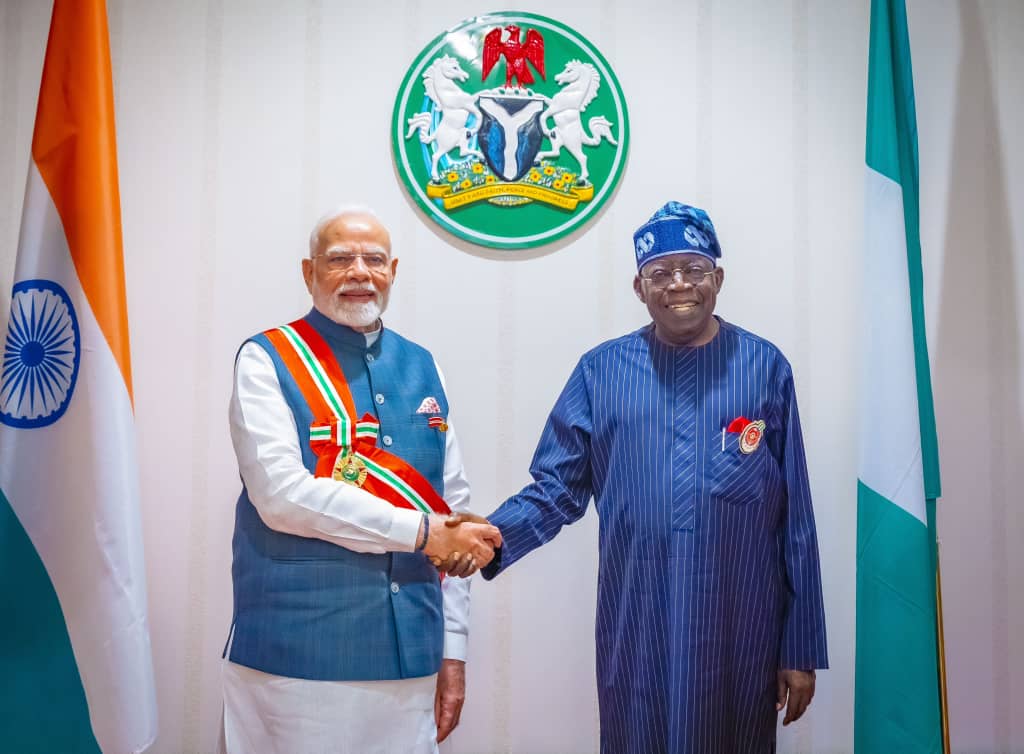…Sign key deals on defence, counterterrorism, trade, infrastructure
In a significant move to solidify diplomatic and economic relations between Nigeria and India, President Bola Tinubu conferred Nigeria’s second-highest national honour on Indian Prime Minister Narendra Modi. The honour recognises Modi’s tireless efforts to strengthen ties between the two nations, particularly in areas of defence, counterterrorism, trade, and infrastructure development.
This recognition came during a pivotal meeting at the Aso Rock Villa in Abuja on Sunday, where President Tinubu and Prime Minister Modi signed several strategic agreements aimed at deepening Nigeria-India relations. The two leaders discussed a wide array of issues ranging from economic cooperation to security and Nigeria’s development priorities, building on the momentum of President Tinubu’s 2023 visit to India.
One of the primary focuses of the bilateral talks was enhancing security collaboration. The leaders expressed their commitment to combating terrorism and piracy, particularly in the Gulf of Guinea and the Indian Ocean. In a joint statement following the meeting, both leaders condemned terrorism in all its forms and pledged to continue joint efforts to combat terrorism and terror financing networks, including the finalisation of the Comprehensive Convention on International Terrorism under the United Nations framework.
“We unequivocally condemn terrorism in all its forms, including cross-border movements of terrorists and terror financing networks,” the joint statement read.
Prime Minister Modi reiterated India’s readiness to support Nigeria’s defence modernization efforts, emphasising India’s growing role as a trusted defence manufacturer. India has already been contributing to Nigeria’s security by providing defence equipment and training, and Modi expressed India’s continued commitment to strengthening Nigeria’s defence infrastructure.
The leaders also highlighted the vibrant economic relationship between India and Nigeria, with India being Nigeria’s largest trading partner and a significant source of foreign direct investment. Over 200 Indian companies operate in Nigeria, creating thousands of jobs and bolstering Nigeria’s economy. Both leaders directed their officials to expedite the finalisation of several key agreements, including the Economic Cooperation Agreement (ECA), Double Taxation Avoidance Agreement (DTAA), and the Bilateral Investment Treaty (BIT), aimed at further boosting trade and investment between the two countries.
“The economic ties between Nigeria and India have been fruitful, and we are committed to expanding this relationship further. Our governments will work to finalise the remaining agreements and unlock even more opportunities for Nigerian businesses,” President Tinubu said.
Infrastructure development was another cornerstone of the discussions. India reaffirmed its commitment to supporting Nigeria’s infrastructure needs through concessional lines of credit and technical expertise. The two nations agreed to work on long-term contracts for the supply of crude oil and liquefied natural gas (LNG), as well as technical assistance in pipeline transmission security and the distribution of cooking gas.
“We are pleased with India’s continued support for Nigeria’s infrastructure development and look forward to the successful implementation of these projects,” President Tinubu remarked.
The two leaders also discussed investments in energy, particularly in renewable energy. They agreed to increase cooperation in solar energy, with a focus on establishing solar parks as part of their membership in the International Solar Alliance (ISA).
Beyond security and trade, Nigeria and India also agreed to enhance collaboration in sectors like agriculture, healthcare, and education. On agriculture, the leaders discussed increasing cooperation in areas such as high-yield seeds, agricultural machinery, and sharing technical expertise. India expressed its gratitude to Nigeria for supporting the Indian Resolution at the United Nations to declare 2023 as the International Year of Millets, and pledged to increase collaboration in this area.
In healthcare, both countries agreed to deepen cooperation, particularly in establishing hospitals and diagnostic centres, as well as deploying innovative health management systems. Prime Minister Modi extended India’s commitment to supply high-quality generic pharmaceutical products to Nigeria under the Pradhan Mantri Bhartiya Janaushadhi Pariyojana (PMBJP) scheme. This initiative aims to provide affordable medicines to vulnerable populations, further supporting Nigeria’s public health infrastructure.
Both leaders also discussed the importance of cultural and educational exchanges between their nations. India has long been a significant partner in Nigeria’s human resource development, offering scholarships and educational opportunities to Nigerian students. The leaders emphasised the importance of expanding these exchanges, building on longstanding historical ties, and promoting mutual understanding.
India’s eVBAB scheme, which facilitates virtual learning, was highlighted as an important initiative to provide Nigerian students with access to high-quality education. The two sides agreed to encourage more Nigerian students to take advantage of these scholarship programs.
Recognising the potential of tourism to enhance people-to-people connections, the leaders called for increased collaboration in this area. They also pledged to work together through international organisations, with both countries reaffirming their support for UN Security Council reforms and mutual backing for permanent and non-permanent memberships.
As part of their broader global engagement, India and Nigeria also committed to deepening cooperation in regional peace and security, especially in West Africa.
Prime Minister Modi’s state visit to Nigeria was marked by a formal welcome, including a 21-artillery gun salute at the Presidential Villa. Following their private discussions, President Tinubu and Prime Minister Modi co-chaired an expanded bilateral dialogue, reaffirming the strength of their partnership and setting a course for further collaboration across multiple sectors.
In recognition of Modi’s pivotal role in advancing Nigeria-India relations, President Tinubu conferred upon him Nigeria’s second-highest national honour, a gesture symbolising the deepening of ties between the two countries.
This visit is expected to be a turning point in Nigeria-India relations, opening new doors for trade, investment, and strategic cooperation in key areas that will benefit both nations in the years to come.

